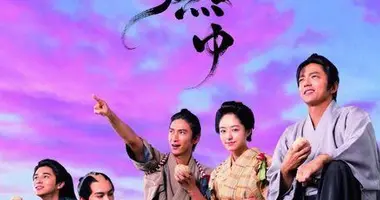The Twilight Samurai
The Twilight Samurai
The Twilight Samurai

by Joe Sinclair, May 2004
How did the samurai really live? In The Twilight Samurai (2004) veteran director Yoji Yamada sets out to answer this question, combining stark historical realism with moving family drama and a slice of nerve-wracking action to portray the life and times of a low-ranking samurai.
Based on the novellas of Shuhei Fujisawa, the film is set in the twilight years of the Edo or Tokugawa Period (1600-1867), a time when the strict hierarchy of the feudal system and neo-Confucian samurai values are beginning to crumble.
Seibei (Hiroyuki Sanada) is unkempt. His kimono is torn and he hasn't washed for days. He doesn't have enough time to look after himself. Since his wife died of consumption he has been struggling to take care of his two young daughters and senile mother whilst working long hours as a menial clerk in a warehouse.
But when he is forced into a duel with the drunkard husband of childhood friend Tomoe (Rie Miyazawa), he gains a reputation as a master of the short sword and his modest life is thrown in to turmoil.
Seibei has sold his long sword to pay for the funeral of his wife, thus relinquishing the symbolic extension of his samurai pride. In a sense he is a man out of time, sharing many common values with a more modern, more liberal world.
Despite his downtrodden status he finds a quiet happiness watching his daughters grow, and he encourages them to think for themselves. Sanada, who is more used to playing comic roles, expertly conveys honour without ambition and pain without despair.
Tomoe is also a modern, free-thinking woman. She has left her rich but violent husband. But Seibei desists from committing to the relationship, painfully aware of the difference in their social standing.
This is Yamada's first period piece and he patiently allows the drama to unfold, drawing you in to the story and on to the edge of your seat. The tension builds towards the film's climactic scene in which Seibei is forced in to combat with the clan's top swordsman, Yogo Zenemon (Min Tanaka), who has himself refused orders to commit seppuku (ritual suicide).
The true conflict is between the samurai code of honour and personal rationale, between unquestionably obeying orders and deciding for yourself, between ancient and modern Japan. But the men are as much in conflict with themselves as with each other.
The fight scenes are used sparingly, built up to with a clammy, pulse-racing tension, and delivered with a realistic edge. Sanada, who is a prot of martial arts star Sonny Chiba (Kill Bill), carries his sword with the shuffling steps and low, thrusting hips of a skilled swordsman.
Unlike the slice and dice blood-letting of films like Kill Bill and Zatoichi, the tension, sweat and blood-loss of the final duel prelude a slow and moving death, which will leave you drained.
Seibei's youngest daughter now an old woman looking back on the past narrates the story. This emphasizes the passing of time as well as the strong connection between past and present.
In fact, the unstable feudal world is relevant to modern Japan, where society is troubled by economic uncertainty, changing values and the gap between materialistic and spiritual happiness. Modern day employees will also relate to the pressures of having to obey the boss.
In terms of character the narration is sometimes sentimental, with Seibei and Tomoe almost seeming too good to be true. But this is no blind homage to a bygone era.
Instead, the film exposes a realistic slice of life in which the bodies of starved peasants float downriver and plainly-dressed samurai work in mundane jobs.
The Twilight Samurai swept the board at the Japanese Academy Awards, winning in twelve categories including best director, best actor and best actress.
It was also nominated for an Oscar in the category of Best Foreign Language Film. 71-year-old Yoji Yamada is known for writing and directing the Tora-San movies (Otoko wa Tsurai yo It's Tough Being A Man) about an itinerant peddler who travels across Japan falling in and out of love whilst attempting a variety of get-rich-quick scams. The series of 48 films ran for 27 years and is certified in the Guinness Book of Records as the longest-running movie series in the world.
In The Twilight Samurai Yamada demonstrates his ability for old-fashioned story-telling threaded with a strong sense of humanity. The film's moving narrative and realistic historical backdrop give it a distinct edge over the recent batch of samurai dramas. Seibei is heroic without being a super-hero, an ordinary man to whom we can and want to relate.
Japan articles by Joe Sinclair
Interview with a Kabuki Actor
Hitch-Hiking in Japan
Japan Travel Tips: Missing the last train in Tokyo
Hot Spring Bathing in Japan
Tokyo Story - Movie Review
Memoirs of a Geisha - Movie Review
Fear And Trembling (Stupeur et Tremblements) - Movie Review
The Fog of War - Movie Review
Zatoichi - Movie Review
Interview with David Mitchell, author of "Cloud Atlas"
Books on Japan
Twilight Samurai: read a movie review of the Japanese Acadamy Award-winning Twilight Samurai: written and directed by Yoji Yamada, starring Hiroyuki Sanada.









